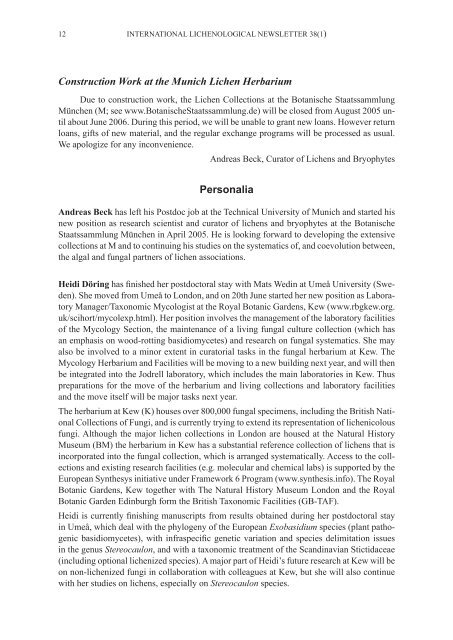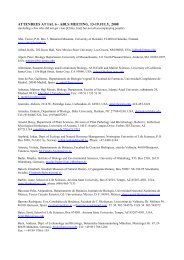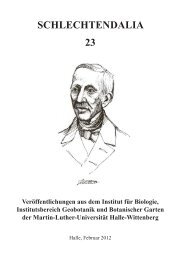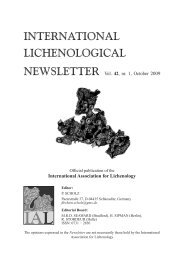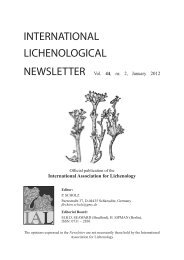NEWS - International Association for Lichenology
NEWS - International Association for Lichenology
NEWS - International Association for Lichenology
Create successful ePaper yourself
Turn your PDF publications into a flip-book with our unique Google optimized e-Paper software.
12 INTERNATIONAL LICHENOLOGICAL <strong>NEWS</strong>LETTER 38(1)<br />
Construction Work at the Munich Lichen Herbarium<br />
Due to construction work, the Lichen Collections at the Botanische Staatssammlung<br />
München (M; see www.BotanischeStaatssammlung.de) will be closed from August 2005 until<br />
about June 2006. During this period, we will be unable to grant new loans. However return<br />
loans, gifts of new material, and the regular exchange programs will be processed as usual.<br />
We apologize <strong>for</strong> any inconvenience.<br />
Andreas Beck, Curator of Lichens and Bryophytes<br />
Personalia<br />
Andreas Beck has left his Postdoc job at the Technical University of Munich and started his<br />
new position as research scientist and curator of lichens and bryophytes at the Botanische<br />
Staatssammlung München in April 2005. He is looking <strong>for</strong>ward to developing the extensive<br />
collections at M and to continuing his studies on the systematics of, and coevolution between,<br />
the algal and fungal partners of lichen associations.<br />
Heidi Döring has fi nished her postdoctoral stay with Mats Wedin at Umeå University (Sweden).<br />
She moved from Umeå to London, and on 20th June started her new position as Laboratory<br />
Manager/Taxonomic Mycologist at the Royal Botanic Gardens, Kew (www.rbgkew.org.<br />
uk/scihort/mycolexp.html). Her position involves the management of the laboratory facilities<br />
of the Mycology Section, the maintenance of a living fungal culture collection (which has<br />
an emphasis on wood-rotting basidiomycetes) and research on fungal systematics. She may<br />
also be involved to a minor extent in curatorial tasks in the fungal herbarium at Kew. The<br />
Mycology Herbarium and Facilities will be moving to a new building next year, and will then<br />
be integrated into the Jodrell laboratory, which includes the main laboratories in Kew. Thus<br />
preparations <strong>for</strong> the move of the herbarium and living collections and laboratory facilities<br />
and the move itself will be major tasks next year.<br />
The herbarium at Kew (K) houses over 800,000 fungal specimens, including the British National<br />
Collections of Fungi, and is currently trying to extend its representation of lichenicolous<br />
fungi. Although the major lichen collections in London are housed at the Natural History<br />
Museum (BM) the herbarium in Kew has a substantial reference collection of lichens that is<br />
incorporated into the fungal collection, which is arranged systematically. Access to the collections<br />
and existing research facilities (e.g. molecular and chemical labs) is supported by the<br />
European Synthesys initiative under Framework 6 Program (www.synthesis.info). The Royal<br />
Botanic Gardens, Kew together with The Natural History Museum London and the Royal<br />
Botanic Garden Edinburgh <strong>for</strong>m the British Taxonomic Facilities (GB-TAF).<br />
Heidi is currently fi nishing manuscripts from results obtained during her postdoctoral stay<br />
in Umeå, which deal with the phylogeny of the European Exobasidium species (plant pathogenic<br />
basidiomycetes), with infraspecifi c genetic variation and species delimitation issues<br />
in the genus Stereocaulon, and with a taxonomic treatment of the Scandinavian Stictidaceae<br />
(including optional lichenized species). A major part of Heidi’s future research at Kew will be<br />
on non-lichenized fungi in collaboration with colleagues at Kew, but she will also continue<br />
with her studies on lichens, especially on Stereocaulon species.


